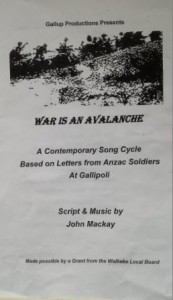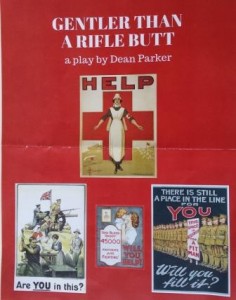After the emotionality of the ANZAC service at Ostend, Waiheke Island, then retiring home to listen to the live radio broadcast of the dawn service at Gallipoli, it seems madness to attend War is and Avalanche in the evening at the Waiheke High School Hall. Ive booked a ticket and feel obliged to now turn up and support local composer and lyricist, John Mckay. He has been awarded a grant fro the Waiheke Local Board to compose and perform a contemporary song cycle based on letters from ANZAC soldiers at Gallipoli.

First impressions of the Hall are one of austerity, with very hard seats and no ambience. The Narrator of the piece, Pat Urlich, a well known local vocalist, is sorting out his spotlight with the lighting box when I arrive. Theres a band comprised of: John Mackay on keyboards, supported by guitar, base and drums. As the lights go out, the poor ambience of the hall fades as suddenly we are engaged by the rich tenor voice of young Maori professional singer/actor Rutene Spooner. Pat Urlich isnt singing tonight (except in some pre-recorded vocals), hes showing of his deep chocolaty speaking voice to great effect in the telling of the Gallipoli Story. Theres no sentimentality here, he tells it as it is. Rutene is joined by Mezzo, Eve-Marie Hess, who has a most unusual quality to her voice. In some numbers its like a choir boy, opening up to a full chest belt (musical theatre style) when required. The cycle is nine songs accompanied with fantastic graphic images, by Bruce Woods, projected onto an up-stage screen. The songs cover a range of themes, beginning with the horror of it all in A Hole in Hell. Sexual tension and frustration between soldiers and nurses is explored in Ive Got an Itch and party mentality on leave (because tomorrow we may die) gets the treatment in Paint the Moon. The last song tells of a field of ghosts in Here is Tehono-i-wairua. Its the first time Ive heard that over eighty thousand Ottoman Turks were killed here, some of them as young as fourteen. In the second half, soprano Rose Myer joins to make up a trio, adding a very high pure layer to the vocal mix. Theres been no schmaltz or emotional manipulation here and the musical styles have ranged from contemporary lieder through the modern musical, jazz and an anachronistic slice of rock and roll. Weve been transported with delight by professional talent and the audience stands in ovation at the end. The Waiheke Local Board has spent wisely here.
Gentler Than a Rifle Butt by Dean Parker

I know nothing about the play or the playwright, Dean Parker, except that this local production is an adaptation of his radio play. To my embarrassment, I find that Deans been around writing since 1974. Playmarket provides me with a list of his titles, some of which I have heard of. Nevertheless, its smacked wrists for me.
Im attending the penultimate performance at the Omiha Hall in Rocky Bay, because I support the Hall and I can be environmental and walk. Walking down the hill on a damp, dark Friday evening in May at 6.30 is a challenge. Its been raining all day and although there is a gap, drops are still dripping from the trees, so that my umbrella is up. Darkness between the sparsely spread street lighting necessitates the use of my wind up torch, requiring two hands. This is particularly important going down Agony Hill a steep walkway with irregular steps.
The adaptation imagines the Narrator from the radio play as an academic lecturer with a slide show of images from Gallipoli and of the Protagonist poet, Rufus Dewar. We are told that while he is not the best New Zealand Poet, he is (arguably) the most important in that he changed the course of poetry in this country. Rufus is an ex Auckland Grammar School boy (part of the establishment) and initially a war enthusiast. Dylan Hinchey is almost perfect for the passionate poet who quickly gets a reality check. Although hes slightly too old for the part, hes very sexy and disbelief is willingly suspended. Predictably, he is wounded and ends up in hospital in Alexandra, a very angry man, ranting against the war and its waste of life. His nurse, Cissie Kerrisk, intelligently played by Renee Cassely is initially horrified by his unpatriotic behaviour, but is gradually won over and they begin an affair. Rufus posts all his poetry to his Mum and the lovers escape on a ship to America on the same day the ANZACS withdraw from Gallipoli, defeated. Mrs Dewar tries to get the poems published, but they are deemed too unpatriotic and contrary to the war effort. A small left wing printer takes up the task, but the book is immediately banned by the Government. The printer, seeing an opportunity, prints more copies to distribute clandestinely. Rufus and Cissie return to New Zealand to become the darlings of the growing anti war movement. They are pursued around the country by a police officer, Arthur Craven, humorously played by Rocky Bays Grant Lilley. Theres a revelation that in retrospect, makes sense. Rufus is having an affair and Cissy finds out. Rufus is bisexual (most gay men in New Zealand before 1986 were) and his lover might be the bachelor leader of the Labour Party, Joseph Savage. Proof is offered in the form of the inscription inside Savages copy of Rufus war poems. There is a peace rally due at the Auckland Town Hall, but the way is blocked by the police. Rufus appears like a saviour and to the awe of the protesters and police flings open the doors of the hall. The only character not in awe, Arthur Craven, pounces and kills the messianic poet with his kosh. The Narrator tells us that on the 24th April 1916 Savages Labour Party swept to power and on the 25th the troops were recalled from the Great War. It is here that knowledge of New Zealand history is needed because Dean Parker is a great story-teller, going to some length to suggest verisimilitude. He relies on the atrocious inattention by the New Zealand curriculum, which left generations ignorant of our heritage, preferring to dwell on British monarchs, European wars, the now discredited hero Edward Gibbon Wakefield of the New Zealand Company and a cute view of pre European Maori.
This is a what if story. By basing Rufus on the British War poets Parker has cleverly made them part of us. Having caught us in his hook and reeled us in, he suggests that the reason for celebrating ANZAC day should be the recall of the troops home, not some landing on an isolated coast in a disastrous campaign ending in withdrawal. The ending however, is too prolonged with the Narrator and the now dead Rufus in a duet of If you want to know where the Private is, which clearly is there to make the play the required length for the radio.
Makes you think, this sort of stuff, doesnt it? This may have been the last year I will attend and ANZAC parade.